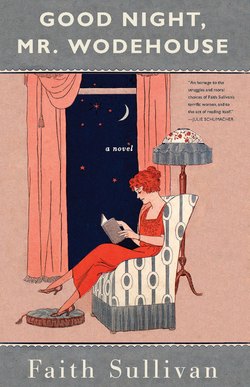Читать книгу Good Night, Mr. Wodehouse - Faith Sullivan - Страница 21
На сайте Литреса книга снята с продажи.
Оглавлениеchapter elevenchapter eleven
WHEN GEORGE AND CORA brought baby Laurence home in August, Cora was still in a wheelchair, though her Boston doctors remained hopeful.
Cora hired both the recently widowed Mrs. Krautkammer to keep house and fourteen-year-old Lizzie Jessup to help with the baby. Elvira burned with envy. Lizzie might be a willing girl, but she was also a dough-faced, pigeon-toed, ignorant one, who hadn’t finished sixth grade and didn’t know the difference between a bread plate and a pastry fork. What kind of influence was that for baby Laurence? Elvira felt passed over—unreasonably, as she would never abandon Hilly or give up her part-time work at the store. Still, wasn’t life unfair?
One day in late October, the bloodless Lizzie wheeled Cora up to the fabric counter, where Elvira stood wrapping a length of lace around a scrap of cardboard. “I’ve come to throw myself on your mercy again,” Cora said, handing the baby to Lizzie. Elvira watched the girl trail off, breathing through her mouth. “I’m planning this year’s Christmas party.”
Cora laid a gloved hand on the wooden counter and cast her eye around the store. Nothing could be further from her city background than this village dry-goods store, yet she was at ease here and grateful for its prosiness. Its very odor—offcastings of fabric sizing, plus woolen mittens, beaver felt, and dogskin coats—lent an odd sense of refuge.
In the East, refuge had never occupied her thoughts. But here, where the sky and land stretched forever, civilization felt precarious. People still spoke with sharp pain of the blizzard of 1888, which had killed so many. And they shuddered to recall the Hinkley fire, in which more than four hundred had perished.
In this dry-goods store, with a staunch country girl named Elvira wrapping lace around a bit of cardboard, Cora felt cosseted and sheltered, oddly at home.
That Sunday afternoon, in the Lundeen parlor, Cora told Elvira, “The lady’s chair by the fire is comfortable.”
Sitting in the chair, lavished with friendship, Elvira found herself borne across the boundary between Earth and Heaven, ushered into a world lovelier, more secure, more comfortable, even better smelling than any she’d dreamed of. What was that scent which seemed to be nothing laid on, but a part of the house itself?
The oil paintings; the deep, soft Turkey carpets; the upholstered furniture and shimmering draperies; the mahogany mantel and marble fireplace—surely these spoke of ease and gaiety.
Cora wheeled herself across the room, frowning and setting her mouth as the carpets resisted her. Elvira rose to help, but Cora motioned her off. “This is good exercise,” she explained, screwing up a thin smile.
From the sofa she gathered up a dress of navy-blue faille, one of several dresses heaped there. Tiny fabric-covered buttons marched up the sides of the sleeves. “You could wear this, don’t you think? You might have to shorten it a bit.” She held it up.
Elvira crossed the room and took the dress in her hands, caressing it. “It’s beautiful. But why can’t you wear it?”
Cora turned the dress to show Elvira the sleeves and the back. “Look at all these covered buttons. Can you imagine how uncomfortable they are when I lean back against this chair?” She grimaced. “Torture.”
“But you’ll be walking again soon,” Elvira said. “And then you’ll regret giving this away.”
“Certainly I’ll be walking again—and dancing! Oh, how I miss the waltz. George loves to waltz. But think of the fun I’ll have buying new things.” With a kind of scorn for herself, she turned the wheelchair away from the sofa. “Now, let’s plan the party.”
When Lizzie looked in later, the two women had finished making their party plans. “The baby’s down for his nap,” Lizzie said. That girl’s strained through a sieve, Elvira thought. No spirit. What Cora needs is someone to buck her up.
Cora asked the hired girl, “A pot of tea? And slice us some of the gingerbread, please. Get yourself a piece while you’re at it.”
Turning back to Elvira, Cora said, “It’s none of my business, but I have to ask.” She clasped her hands beneath her chin in a girlish gesture, as if meaning to coax a secret. “A girl as pretty as you must have a swain.”
Elvira looked confused. “A swain?”
“A suitor?”
“I . . . no, no.”
“I didn’t mean to embarrass you. But you’re lovely and fun. Someone should be setting his cap for you.”
Cora sounded like Nell. “I guess I’m just not interested in that kind of thing.”
“Well, someday.”
Easy with one another, they sipped tea and finished two slices of gingerbread each before Elvira said good-bye, taking the dress with her.
“George could deliver the clothes,” Cora told her.
“Oh, no,” Elvira said, “I can’t wait to show them to Nell.”
Walking home through the early November gloom, with a bleared sun low behind banked clouds, Elvira relived the afternoon’s plummy pleasures: the strong, pliant baby, soft and warm against her; the genuine appreciation she felt from Cora; the beautiful clothes she held in her arms, given without condescension or patronage. She clasped them to her face, savoring the scent of friendship. A swain?
With a puzzled scowl, she shook her head and plunged on.
